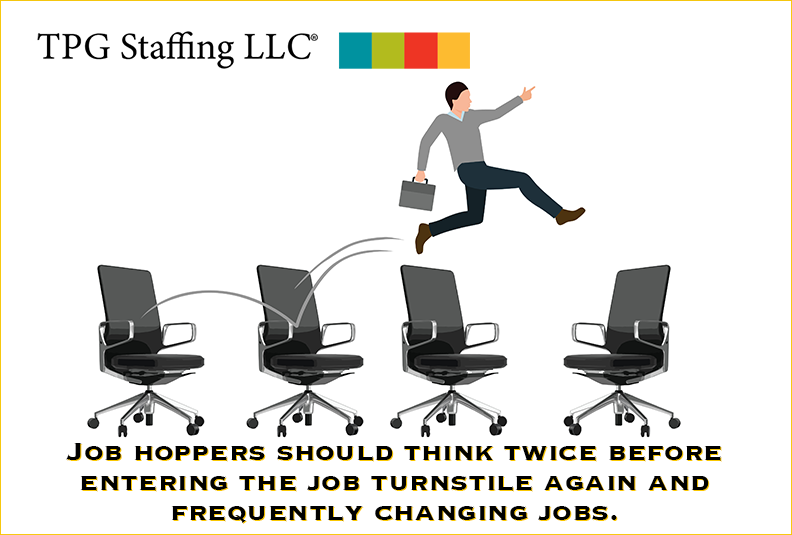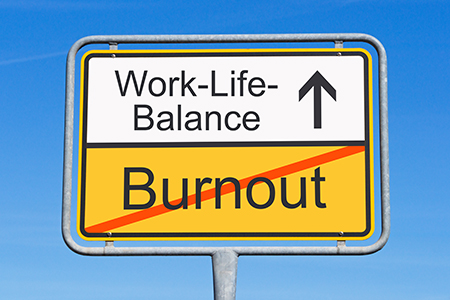
Job hoppers should think twice before entering the job turnstile again and frequently changing jobs. Employers are once again viewing it as a red flag during job interviews.

Ms. Pomerantz is the CEO of TPG Staffing LLC and has over 35 years’ experience in recruiting top talent for some of the largest companies in the world and start-ups alike. She earned a BS from the University of Pittsburgh and a Master’s in Human Resource Management from Rutgers University. She also has senior HR credentials, including both SPHR and SHRM-SCP certifications.

During the COVID pandemic, “job hopping” became very popular, especially among younger workers. Online “career coaches” and recruitment firms advised employees to become job hoppers and change jobs frequently to secure better opportunities and higher pay. Now, in 2025, the saying “everything old is new again” is becoming increasingly evident in the hiring practices of managers. Beginning with employers requiring their employees to return to the office once again, as they did before the COVID-19 pandemic, or, at the very least, work a few days a week in the office. Another recent workplace development being widely reported is the return of employers viewing job-hopping negatively during the interview process. Employers have returned to the traditional view that a candidate who frequently changes jobs is not a good investment of their company’s time and money, especially if the position requires training or on-the-job learning to get up to speed.
Below are 6 reasons to consider before you enter the turnstile again and decide to change jobs:
1. Job Hopping Can Carry a Negative Perception of Instability and Lack of Commitment
In the not-too-distant past, hiring managers held a traditional view that job hopping was a red flag on an applicant’s resume. Employers were concerned that the employee, whose resume showed a history of job hopping, would stay long enough to make a meaningful impact at their next workplace. In 2025, this previously widely held negative perception is being adopted again during the interview process. Today’s hiring managers are once again viewing job-hopping candidates as possibly lacking stability or demonstrating an inability to commit to any company for more than a short period of time.
This is especially evident for industries that rely on long-term relationships, such as law, finance, or academia. Job hopping in these industries carries the highest risk of negatively impacting your reputation and making it significantly harder to secure senior roles or achieve long-term career advancement.

2. Job Hoppers Sometimes Lack In-Depth Expertise
Another potential drawback of job hopping is that it often prevents employees from developing in-depth expertise in a specific role. Mastering a job and developing specialized skills typically takes time. When you jump from job to job, you may never fully settle into a role long enough to hone the specific skills and experience that can set you apart in your industry.
The one exception to the rule might be if you are starting your career and decide to choose job hopping as a strategy to expose yourself to different responsibilities and work environments. If you continue to switch jobs frequently even after this initial time period at the beginning of your career, employers may begin to view you as more of a generalist, which will likely hurt your career growth in the long run.

3. Missed Opportunities for Internal Growth
Staying at one company for an extended period often provides opportunities for internal advancement and career growth. Employees who consistently demonstrate their capabilities over time are more likely to be considered for promotions, leadership roles, and other professional development opportunities that can significantly advance their careers.
Today, in 2025, even for highly skilled candidates, a hiring manager choosing between two candidates—one who frequently changes jobs and one who doesn’t—will likely choose the candidate who is not viewed as a job hopper, as they will be deemed more reliable. It is essential to remember that, in most cases, job promotions typically follow an employee’s years of demonstrated, proven performance at the company. To achieve even higher levels of advancement, it is essential to develop strong business relationships that provide you with the necessary visibility and credibility to be considered when opportunities arise within your organization.

4. Limited Access to Long-Term Benefits
Many companies offer long-term benefits such as retirement plans, pension contributions, stock options, or bonuses based on tenure. Job hoppers often miss out on these long-term incentives, which can add substantial value throughout their careers.
Additionally, companies that offer career development programs or other benefits that accumulate over time tend to reward employees who remain with the company for several years. By constantly changing jobs, employees may miss the opportunity to fully leverage these benefits, potentially limiting their long-term financial and professional growth.

5. Job Hopping Can Lead to Burnout and Lack of Work-Life Balance
Changing jobs frequently may initially seem like a way to escape stressful work environments, but it can actually contribute to burnout. Adapting to a new role, company culture, and work environment every few years can be mentally and emotionally exhausting.
Employees who stay in a job longer often develop the resilience and coping mechanisms needed to handle workplace stress. They also have more time to establish work-life balance, while job hoppers might struggle to find stability and satisfaction in each new role, leading to increased stress and a lack of personal fulfillment.

6. Sometimes You Might Be Going Back To Square One
A strong professional network is one of the most valuable assets for long-term career success. However, building and nurturing relationships takes time. If your strategy is to switch jobs every couple of years, it won’t be easy to form any lasting connections with colleagues, mentors, and industry leaders within your self-imposed job expiration time limit.
Job hoppers, by definition, voluntarily choose to start over and go back to square one each time they start a new job. At each new place of employment, they will need to work with new team members and successfully navigate new bosses.

Conclusion: Staying Put Could Actually Be Your Best Chance To Move Forward

Many young workers today still believe that job hopping is the easiest way to advance their careers quickly. While it is always important to remain flexible and open to new opportunities, consistently changing jobs can potentially hinder your ability to build deep expertise, a strong network, and career stability —essential components for long-term success.
For employees seeking to advance their careers to even higher levels of achievement, it’s essential to consider the value of staying with a company long enough to fully develop key skills, build meaningful relationships, and capitalize on opportunities for internal growth. Strategic career moves – where job changes are made thoughtfully and with a clear strategic vision – will ultimately serve you better in the long run than being labelled as a frequent job hopper.
TPG Staffing has decades of experience in the staffing industry. We are here and ready to help you find your next job and advance your career. If you would like to know more about how TPG Staffing can help you with your job search, please call us at 732-246-7100.